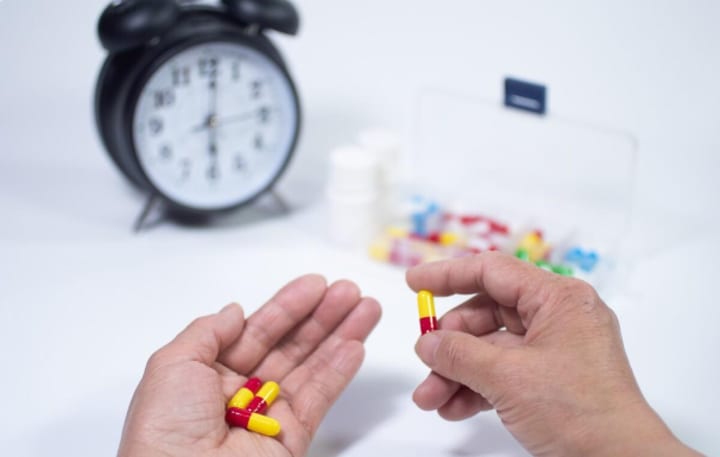What is the best time to take antihypertensive medication?
Two studies of the timing of antihypertensive medications yielded different conclusions

Some of our readers often ask the question, "What is the best time to take antihypertensive drugs to lower blood pressure? In the morning or at night?"
With the continuous progress of medical research, the management and control of hypertension have become more and more refined. The original pursuit may be to take antihypertensive drugs, after a few hours to measure, blood pressure down on the good. With the further popularization of ambulatory blood pressure monitoring, how to maintain the blood pressure level within 24 hours and as long as possible to meet the standard has become an important aspect of reducing the health risks of hypertension.
In terms of antihypertensive drug therapy, the current treatment options, not only combine the situation, a reasonable choice of antihypertensive drugs, and a reasonable choice of antihypertensive drugs take time, to ensure the long-term efficacy of antihypertensive drugs and 24-hour blood pressure control smoothness, has also become the research direction of many clinical studies, and about antihypertensive drugs in the end what time to take the benefit of more discussion, now also become a topic of concern, and practical It is a real issue related to the blood pressure control of hypertensive patients.
Two studies on the timing of antihypertensive medications reach different conclusions
In a prospective study of the chronology of hypertension medication published in 2019, more than 19,000 hypertensive patients with a mean age of about 60.5 ± 13.7 years were included and randomly divided into two groups according to a one-to-one ratio, choosing to take antihypertensive medication after rising in the morning and at bedtime, respectively.
After adjusting for age, sex, renal disease, smoking, lipids, blood glucose, and systolic blood pressure level at bedtime, the analysis showed that patients taking antihypertensive medication at bedtime had a 45% reduction in the risk of major cardiovascular events and a 49% reduction in the risk of stroke. The risk of stroke was reduced by 49% and the risk of cardiovascular death was reduced by 56%.

The results of such a study were widely publicized at the time, claiming that many people were wrong to take antihypertensive drugs in the morning and that taking them at bedtime was the best choice. But is it too biased to assume that all hypertensive patients should take their antihypertensive medication at bedtime based on such a study alone?
In a new study recently released at the annual meeting of the European Society of Cardiology, conclusions were reached that contradict the above findings. In these new studies, more than 21,000 patients with hypertension were included, again using a randomized grouping into two groups, with one group taking antihypertensive medication after rising in the morning and the other taking it at bedtime. The study was followed for more than five years and recorded hospitalizations for cardiovascular disease, stroke, and cardiovascular death for participants in both subgroups since the study began.
The analysis of this new study showed that the incidence of these cardiovascular events was 3.4% in the group taking antihypertensive medication at bedtime and 3.7% in the group taking antihypertensive medication in the morning during the 5-year follow-up period, and the final data analysis showed that there was no significant difference in the reduction of cardiovascular time occurs between the different time points of taking antihypertensive medication.
In the face of two studies with different conclusions, which one should we believe? The former study overturned conventional knowledge and found that taking antihypertensive drugs at bedtime would bring a hugely beneficial effect; while the latter study was updated and the number of participants reached 21,000, the conclusion reached was painless. Seeing this, I believe that many friends will feel at a loss, this study, that study, do not know who to believe.
Three major international societies of hypertension, giving position papers on the timing of antihypertensive medication
To clarify this issue, on August 16, 2022, the world's three leading societies on hypertension, including the International Society of Hypertension (ISH), the World Hypertension League (WHL), and the European Society of Hypertension (ESH), published a position paper on the timing of antihypertensive medication, and the relevant points in this paper can be used for reference.
The paper states that one of the key goals of antihypertensive therapy is to achieve complete control of blood pressure over 24 hours using long-acting antihypertensive drugs.
For this point, it is now the consensus of hypertension drug therapy, and most of the antihypertensive drugs on the market, especially some new antihypertensive drugs, are also long-acting antihypertensive drugs, it should be noted that although long-acting antihypertensive drugs are drugs taken once a day, it does not mean that the drugs are necessarily able to control blood pressure steadily within 24 hours, and such drugs enhance the compliance of taking drugs, but they are not necessarily able to more Stable control of blood pressure. We will discuss how to choose the time to take the medication later.
About the benefit of taking antihypertensive medications at bedtime, the position paper argues that the current study designs comparing the use of antihypertensive medications at bedtime with other times are largely inadequate or not rigorous, and in some cases have methodological limitations, and therefore do not demonstrate a clear benefit of taking antihypertensive medications at bedtime.
Regarding the timing of antihypertensive medication, the position paper states that until high-quality evidence is available, it is still appropriate to follow the clinical protocol for most hypertension drug therapy, with long-acting antihypertensive medications alone and in combination, and to take antihypertensive medications after rising in the morning.
Needless to say, this recommendation is a very conservative one in terms of dosing time. The main implication is that there is no clear evidence at this time, and therefore, the original rule of choosing to take medication after rising in the morning should still be followed.
A little personal reflection
Regarding the above 2 studies with different conclusions and the recommendations given by the three universities, I would like to share my personal opinion for your reference.
First of all, for some large clinical research data conclusions, although there is a certain reference significance, do not be rigidly applied, after all, the conclusions of such studies, are derived from statistical analysis of data, which is the final average data of many patients, this conclusion applied to each individual, there will inevitably be a situation that does not meet the relevant conclusions.
Take the matter of the duration of antihypertensive drugs, whether it is the conclusion of the relevant studies or the latest recommendations given by the three universities, it is also for reference only. For different individuals, the most suitable time to take medication can be found by considering their actual situation.

For example, for those who have a clear problem of elevated blood pressure at night, taking antihypertensive drugs after rising in the morning, the blood pressure concentration of antihypertensive drugs will decrease at night, and the antihypertensive effect will be weaker, so the control of blood pressure at night may be less effective, and the risk of cardiovascular and cerebrovascular events at night will be further increased. And if you are a friend who has a blood pressure peak in the morning and afternoon respectively after waking up in the morning, it should be a better choice to take antihypertensive drugs after waking up in the morning. Therefore, in the choice of antihypertensive medication time, it is best to be able to combine their blood pressure fluctuations and choose to take the drug after the peak blood pressure concentration time and blood pressure peak time coincide, to better play the role of antihypertensive drugs and pressure control smoothness.
In the selection of antihypertensive drugs, as we said earlier, although the same long-acting antihypertensive drugs, different antihypertensive drugs for the smoothness of blood pressure control also have certain differences, we should not only pay attention to the half-life of drug metabolism in the body but also pay attention to the drug for blood pressure control "peak-to-valley ratio". This value refers to the ratio of the magnitude of blood pressure reduction when the drug reaches its peak blood concentration after taking antihypertensive drugs to the magnitude of blood pressure control when taking antihypertensive drugs for the second time, this ratio is more reflective of the smoothness of long-acting drugs, time, nifedipine controlled-release tablets, etc., are antihypertensive drugs with a peak-to-valley ratio close to 1, and the smoothness of blood pressure reduction is often better.
In addition to these pharmacokinetic indicators of the drug, each hypertensive patient himself, also depends on the actual blood pressure control of the drug, such as amlodipine and nifedipine controlled-release tablets, from the peak-to-valley ratio of blood concentration smoothness, nifedipine controlled-release tablets to beat amlodipine, but some friends just eat amlodipine antihypertensive effect is better, blood pressure is more stable, eat nifedipine controlled-release tablets, but If the effect of blood pressure control is not good, it is not necessary to look at these dead indicators, continue to use amlodipine is very good.






Comments
There are no comments for this story
Be the first to respond and start the conversation.